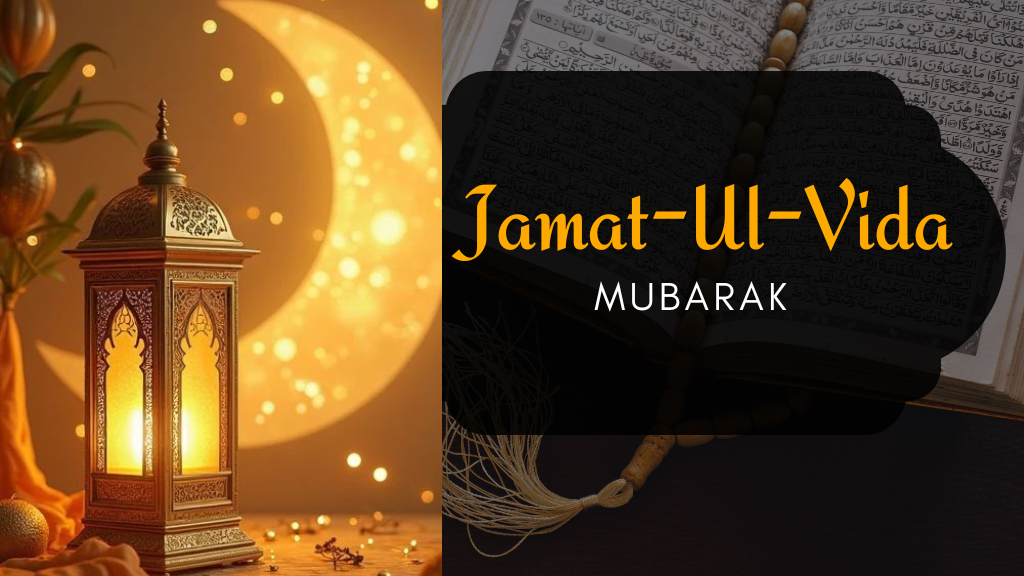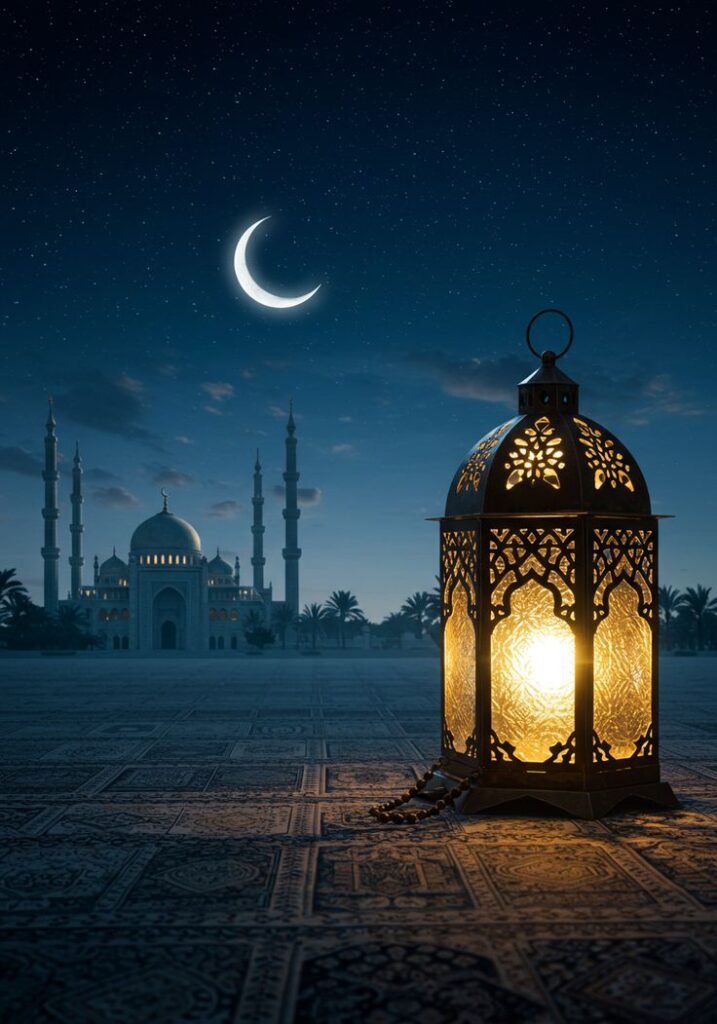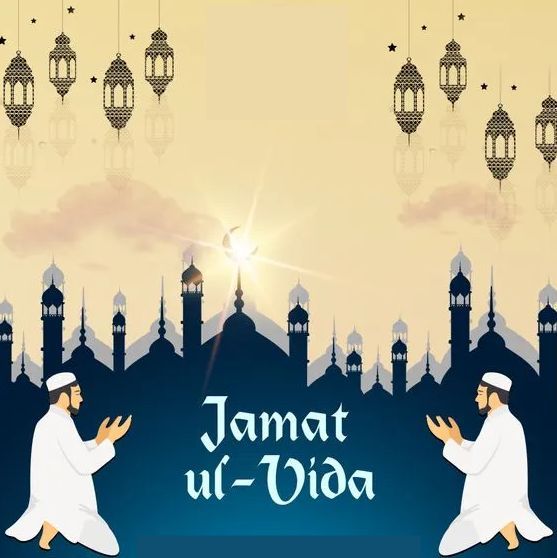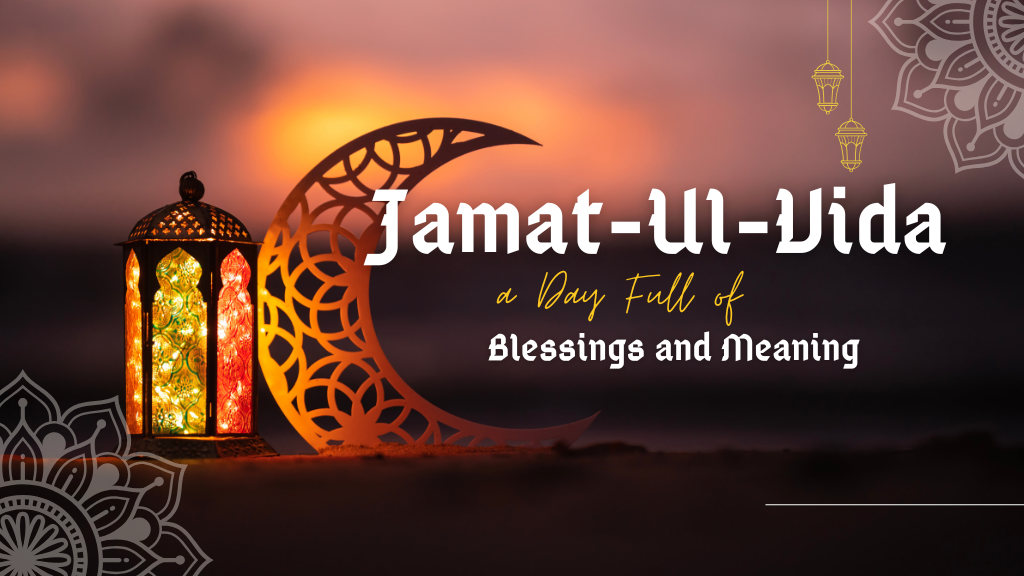This year,Jamat Ul-Vida 2025 will be celebrated on Friday, 28 March 2025, the final Friday of Ramadan, filled with prayers, reflection, and heartfelt greetings.
Jamat ul-Wida, also known as Jamat ul-Wida, is a significant day in the Islamic calendar, which marks the last Friday of Ramadan- the holy month of fasting. It also reminds Muslims to prepare for the joyous festival of Eid al-Fitr, which follows shortly after. On this day People get involved in many types religious activities such as reading the Quran to seek the blessings of the divine power,seek forgiveness, and reflect on the essence of Islam. In 2025, Jamat Ul-Vida will be observed on March 28. In this article, we will explore the date, history, and significance and observances of this auspicious day.

Meaning of Jamat-ul-Vida
The word Jamaat ul Vida is Arabic, and it translates to Friday of Farewell and carries deep significance. The term comes from the words ‘Jamat’ represents ‘gathering’, which symbolizes unity of the Muslim community coming together for worship, and ‘Wida’ stands for ‘farewell’, signifying the sentiment of bidding farewell to the blessed month of Ramadan. Jamaat ul Vida is also known as Al-Jumu’ah al-Yateemah and Alvida Jumma. It is a momentous occasion that brings Muslims closer to their faith and encourages them to perform good deeds.
Date of Jamat Ul-Vida 2025
Jamat Ul-Vida is not fixed to a specific date in the Gregorian calendar, as it follows the Islamic lunar calendar. It falls on the last Friday of Ramadan, which in 2025 corresponds to March 28. Jamat Ul-Vida is a day of heightened spirituality, and Muslims around the world prepare for it with great reverence. It serves as a final opportunity to seek blessings, forgiveness, and divine mercy before the conclusion of Ramadan.
Muslims mark this day with immense devotion, as it signals the approaching end of Ramadan and the arrival of Eid-ul-Fitr.

History of Jamat Ul-Vida
In Islam, Friday is considered as the holiest day of the week. It is known as Jumu’a or ‘Jummah’.
The origins of Jamat ul-Vida are historically rooted in the time of Prophet Muhammad (peace be upon him). According to the history of Jamat Al Vida, an angel of Allah enters the mosque and listens to the imam during Friday prayers. People are rewarded for going to the mosque early in the morning to pray on Jamat ul Wida. Prophet Mohammad (PBUH) also said that Allah would forgive the sins of those who offer the Friday Namaz.
Muslims have continued this tradition, considering Jamat Ul-Vida a day to renew their faith and strengthen their connection with Allah. On the occasion of Jumat-ul-Vida, the sacred book of Quran is recited, and special prayers are offered by the followers of Islam.
Muslims also believe that Allah would forgive all the sins of those who offer the Friday prayers on a regular basis. On this day, they ask for forgiveness for their misdeeds and beg for Allah’s direction in their future lives.
Significance of Jamat ul-Vida
Jamat Ul-Vida is a day of immense spiritual importance. On this day Muslims offer extra prayers, recite holy Quran, and indulge in charitable acts. Here’s why it holds such a special place in Islamic tradition
1. Final Friday of Ramadan:
Ramadan is a month of fasting, prayer, and self-discipline. Since it is the last Friday of Ramadan, it is considered a golden opportunity to seek forgiveness, performing good deeds, and renewing faith through prayers and Quran recitation before the holy month ends.
2. Day of Forgiveness:
Jamat Ul-Vida is considered a day of mercy and forgiveness. Muslims use this day to repent for their sins and seek Allah’s forgiveness. It is believed that sincere repentance on this day can lead to the cleansing of one’s soul and a fresh start.
3. Communal Unity:
On Jamat Ul-Vida, Muslims gather in mosques to offer special prayers for blessings upon themselvesand others.
4. Preparation for Eid al-Fitr
Jamat ul-Wida marks the beginning of the Eid-al-Fitr festival which is celebrated with great fervour and devotion, the festival that marks the end of Ramadan.
5. Dua (Supplication) and Charity
- Muslims engage in heartfelt dua (supplication), seeking blessings for themselves and others.
- Giving to charity, known as Sadaqah, is highly encouraged as a means to purify wealth and help those in need.

How to celebrate Jamat Ul Vida
Wearing New Clothes:
Muslims start the day by taking a bath early in the morning, putting on new or clean clothes, and attending the special congregational prayers at mosques.
Special Prayer:
Muslims attend mosques for the Jumu’ah (Friday) prayers, which include a sermon (khutbah) delivered by the imam. The sermon often focuses on the significance of Ramadan, the importance of gratitude, and the need for continued devotion after the holy month.
Congregations are a must for males, while women can offer prayers at home.
Recitation of the Holy Quran:
On the occasion of Jumat-ul-Vida, the sacred book of Quran is recited. Many believers make heartfelt duas for personal well-being and global peace. They assess their progress, seek forgiveness for any shortcomings, and set goals for the future.
Performing Ibadat:
Men gather together on the day of Jamat ul Vida and recite stories and teachings from the holy book of the Quran and learn from the life of Prophet Mohammed.
Offering Charity:
Muslims give to the poor, help those in need, and perform other good deeds to earn Allah’s favor. Charitable work is one of the most essential pillars of this festival.
Family and Community Gatherings:
Families and communities come together to share meals and strengthen bonds. It is a time to foster love, compassion, and unity.
Jamat Ul-Vida 2025, observed on March 28, is a sacred day that marks the farewell to Ramadan.As the holy month draws to an end, this day serves as a powerful reminder to carry forward the virtues of kindness, faith, and devotion beyond Ramadan.
Furthermore, Muslims give zakat, an act of charity believed to bring abundant blessings and prosperity during this time of the year. It is believed that those who fulfill this duty will be rewarded in the future.

